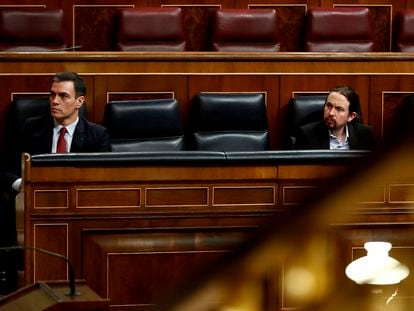Coronavirus deaths in Spain now exceed 4,000, with 655 in just 24 hours
The total number of infections has passed the 56,000-mark, up 8,578 on the day before
/cloudfront-eu-central-1.images.arcpublishing.com/prisa/XKUQIXSPBRCUFGLT5PTFC5TPAM.jpg)

The latest official figures released by the Spanish Health Ministry on Thursday revealed that 655 people have died from the SARS-CoV-2 coronavirus in the last 24 hours. That brings the total number of deaths in the country to 4,089. A total of 56,188 people have been infected, with 31,912 currently in hospital. Of these, 3,679 are in intensive care, while 7,015 patients have recovered and have been released from hospital.
Yesterday saw Spain overtake China in terms of the total number of deaths from the coronavirus, and the country is now second only to Italy.
Unfortunately we still have a larger number of deaths than we would likeFernando Simón, the director of the Health Ministry’s Coordination Center for Health Alerts
Speaking at the daily press conference on Thursday, Fernando Simón, the director of the Health Ministry’s Coordination Center for Health Alerts, explained that “12.5% of patients had been cured.“ This figure, he continued, ”is rising every day. Unfortunately we still have a larger number of deaths than we would like. The majority, 67%, are aged above 80.”
“We have gone from an increase of more than 700 [738] yesterday to slightly over 600 today [655],” Simón said about the latest figures for coronavirus deaths. “We don’t know if this will be a trend, but it does give us a bit of hope.”
Health Minister Salvador Illa agreed that figures “indicate a change in trend that leads us to believe that we are beginning a stabilization phase.”
In the last 24 hours, Madrid – the region that has been worst hit by the coronavirus – has seen 2,569 new cases, 71 of them critical, and 265 deaths. Madrid has the highest number of patients in intensive care: a total of 1,221, which is 33.2% of the total in Spain of 3,679. The region has also seen more than half of total deaths, with 2,090 of 4,089. Madrid has also, however, registered the highest number of patients who have recovered, with 3,882 of the 7,015 total.
Among those who have been discharged from hospital care after contracting the coronavirus is Deputy Prime Minister Carmen Calvo. The Socialist Party (PSOE) politician wrote via Twitter that she would be “continuing with medical treatment in her home, remaining isolated.” A number of high-profile politicians have also been infected with the coronavirus.
Spanish supermarkets
At the same press conference on Thursday, the joint operational chief of the National Police, José Ángel González, voiced words of thanks for shop staff during the crisis. “Today I would like to thank the work being carried out by supermarket employees, who, with their efforts, are ensuring that citizens are not short of supplies,” he said.
He also added that hoax messages were being shared via social media warning that domestic violence offenses were on the rise. “This is not true,” he said. “They have drastically fallen. As have all crimes. Have no doubt that we are not letting our guard down.”
Problems with tests

The rapid coronavirus tests that the Spanish government has been promising, and which it is planning to use to determine the real contagion levels in Spain, do not work properly. That is what microbiology laboratories in several major Spanish hospitals have found on examination of the kits that recently arrived from China. “They do not detect positive cases as we would have expected,” said a source who took part in the trials of the kits, and spoke on condition of anonymity.
The rapid tests, which were manufactured by the Chinese company Bioeasy, have a sensitivity level of 30% when this should be 80%, according to the same sources. The conclusion of the experts who have evaluated the kits is that the health authorities should continue to use the current molecular testing methods, known as PCR, and which take longer to complete.
The Chinese embassy in Spain released a statement on Thursday morning saying that the company from which the products had been purchased, Shenzhen Bioeasy Biotechnology, is yet to receive a license from the Chinese National Administration for Medical Products for the sale of its products. “The Chinese trade Ministry offered Spain a list of classified suppliers,” the statement said. “Shenzhen Bioeasy Biotechnology was not included.”
Speaking to the press on Thursday, Simón recognized that around 9,000 of the fast tests were defective, and had since been returned. The health expert added that new providers had been found which would supply both rapid testing kids and serological tests.
Infections among the security forces

Spain’s Interior Ministry has reported that 229 Civil Guard officers have tested positive for the SARS-CoV-2 coronavirus, while there are 199 positives among members of the National Police. The ministry did not supply information about the number of officers who are in quarantine due to symptoms that are compatible with the Covid-19 disease, but unions estimate that there could be 9,000 in this situation across all forces.
A total of 150 local police officers are thought to have been infected, along with a hundred or so members of the military, according to union figures. This brings the overall estimated total to 700 people.
So far, three members of the Civil Guard have died from Covid-19. The force is the worst-affected of Spain’s security services so far.
Blow to employment

The restrictions implemented under the state of the alarm have meant a serious blow to the Spanish labor market. The health crisis is causing a flood of temporary job suspensions, a process known in Spanish as an ERTE.
The number of workers who have been subject to ERTEs so far in Spain is around 1.5 million, according to information put together by EL PAÍS based on data supplied by 13 of the country’s 17 regional governments and the Labor Ministry. The calculation includes estimations for Madrid, which has been hardest hit so far by the coronavirus crisis, Murcia, the Balearic Islands and the Canary Islands. The latter three regions are suffering in particular during this crisis given the importance of tourism to their economies.
Spain’s department store giant El Corte Inglés has filed an ERTE for 25,900 of its employees, given that only its supermarkets and consumer goods outlets are still open. The company has pledged to top up its employees’ unemployment benefits during the period of the ERTE so that they continue to receive 100% of their salaries.
Swedish furniture and decoration giant IKEA, meanwhile, on Tuesday filed an ERTE for 83% of its nearly 8,000 employees in Spain. All of its stores in Spain have been closed since March 14, and will remain so until the end of the state of alarm.
Spain’s small and medium businesses are also concerned about the impact of the coronavirus crisis. According to a poll from the Spanish Confederation of Small and Medium Business (Cepyme), 96% of respondents believe they will be hurt by the ongoing outbreak.
Solidarity from Spanish giants
A series of major companies from Spain’s blue-chip Ibex 35 has begun coordinating so that they can donate essential materials to help Spain’s health system combat the coronavirus crisis. Banks BBVA and Santander, retail giant Inditex, power company Iberdrola and telecommunications provider Telefónica have joined forces to provide a response to the ongoing pandemic, and have invited more companies to contribute.
The donations have been styled as “a coordination effort,” rather than the creation of a fund. “The companies want to coordinate so that the assistance best responds to the needs of the health authorities, and so that there is no duplication of efforts,” sources with knowledge of the plan explained.
According to Spanish news website El Confidencial, each company has pledged €25 million. But the final amount will be up to each firm, and the focus is on getting hold of the necessary materials and organizing so as to meet specific needs.
Experimental treatment

Health authorities in Madrid have begun exploring a possible experimental treatment for serious cases of the coronavirus: the direct transfusion of blood plasma from a person who has recovered from the infection. The Madrid Transfusion Center is working against the clock with several hospitals in the first clinical trial, that is still in a preliminary state and awaiting authorization from the Health Ministry.
In the United States, the Food and Drug Administration (FDA) has authorized the use of this treatment for seriously ill patients. The Spanish multinational Grifols, which is one of the world’s largest producers of blood derivatives, announced on Wednesday that it had reached an agreement with the FDA to obtain blood plasma from patients who had recovered from Covid-19, process it and make an experimental medicine based on the hyperimmune immunoglobulins, the protein generated by the human body to fight infection.
King makes surprise visit to Madrid field hospital

Spain’s King Felipe VI made a surprise visit on Thursday to the IFEMA convention center in Madrid, which has been turned into a field hospital for coronavirus patients. The monarch, who did not announce his visit, toured the facility while wearing a protective face mask and gloves. He was accompanied by Health Minister Salvador Illa, Defense Minister Margarita Robles, and Madrid Mayor José Manuel Martínez Almeida.
Private healthcare facilities cut staff
While some private healthcare facilities have been placed at the disposal of public authorities to be used for coronavirus patients, others, which are used for consultations and tests unrelated to the pandemic, have been temporarily closed. With revenue falling by 80%, according to the sector, most companies have decided to cut staff.
“We need reorganization because otherwise many centers will no longer be viable,” said Carlos Rus, the president of the Spanish Private Healthcare Alliance (ASPE).
According to ASPE, the job cuts have affected cleaners, administration staff and specialists like physiotherapists, dentists and plastic surgeons. The Spanish labor union CCOO, however, has questioned the layoffs. “Lots of help is needed to fight against the coronavirus in all departments and areas. Even the administrative support workers of the centers that have been closed could help, for example, assisting and informing the families of those affected.”
Based on reporting by Elena G. Sevillano, Ana Alfageme, Manuel V. Gómez, Josep Cata Figuls, Patricia Ortega Dolz, Miguel González, Manuel Ansede and Sonia Vizoso.
English version by Simon Hunter and Melissa Kitson.

/cloudfront-eu-central-1.images.arcpublishing.com/prisa/3ZML3TW77RFL3MWP6YSJDK7IBI.jpg)










































